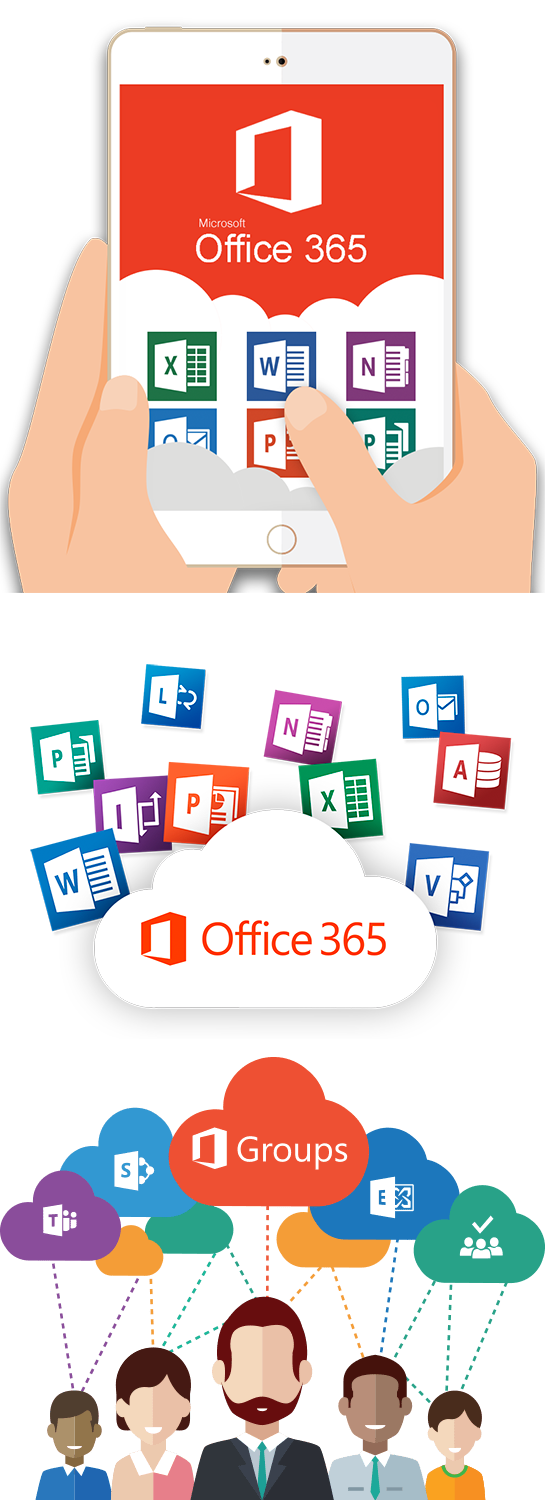Portland Office 365 Migration and Support
Office 365 Migration. Let us manage your Office 365 account for you.
Thinking About Office 365 and all the benefits?
Office 365 Migration combines the most advanced technology innovations along with superb managerial efficiency to help your enterprise work its best.
Many firms have contemplated making the move to Office 365, but haven't quite taken the step yet. Why is this? Fear of change can be issue for both managers and line employees. Retraining personnel is always a challenge. Concerns about documentation and data integrity can create headaches that most people hope to avoid.
But these concerns really shouldn't be objections. Already most of us are used to syncing and storing much of our data in the cloud while on our mobile devices. Hard media such as thumb drives now seem to be of the horse-and-buggy days.
Why migrate to move to Office 365 now? Companies of all sizes are implementing Office 365 migration because of the myriad efficiencies and compatibilities involved. Simplicity, speed, security, scalability. It's all there. Reducing headaches for you is a key part of the process, and your information technology environment can be made as seamless as possible.
Opportunities to gain market advantages abound. "Few companies are building cyber and privacy risk management into their digital transformation correctly," says Sean Joyce, US cybersecurity and privacy leader for PricewaterhouseCoopers in a recent report. "The winners of the future are going to be the ones that from the design phase all the way to production build in that risk management," he says. "it’s a brand-defining opportunity.”
The move to Office 365 helps implement these considerations, and heralds a vast new frontier of lively, efficient, and workable solutions that buttress all of a business enterprise's key assets. Every firm that has an on premise Microsoft Exchange server can take advantage of these latest advances. Email mailboxes from Google and other services can be deftly converted to Office 365 if you have the right people doing the job. A capable team that manages the migration process can guarantee a skilled transition. Since Microsoft is handling the data, it's vast economies of computing power, hardware, scale, and brains mean that they can cover any outages and deploy incredibly more sophisticated data protections than companies or local vendors can do onsite.
Also, Office 365 Migration makes the company less of a target for physical or social hacking. A firm's data becomes completely separate from its local footprint, thus creating a vast moat for potential hackers to attempt to vault. The human element of error on site is also reduced. The vast majority of security weaknesses find their origin in quotidian occurrences such as typos, non-activated security measures, phishing emails inadvertently opened, and malicious links clicked. Employee password security can be unfortunately weak, as private and firm passwords are often recycled, and the demarcation between private and firm use of devices and apps is frequently blurred. The "cyber-day" cycle often includes work done at home in the mornings, continued while on commute, and finished up at home in the evening, all on a mix of work and home devices. These devices are frequently connected with home based technology infrastructures or random passing wi-fi signals which creates multiple openings for hackers. This can be exacerbated when family members who are not part of the firm have informal access. The typical information worker is lightly supervised. Brief breaks to look at social media or news groups can be common and create security risks due to exposed misconfigurations.
Every firm considering the move to Office 365 faces unique challenges, so migration will never be a uniform process. Bespoke remedies provided by a skilled team are necessary. For instance, hybrid solutions that allow companies to migrate both mobile and desktop users can be implemented via the Active Directory Federation Services. This state of the art system utilizes a single sign on for all processes.
Everyone who has an on premise Microsoft Exchange server can take advantage of these new opportunities. There is also no need to pay for Microsoft Exchange Licensing. Since everything is hosted elsewhere, there is no need to invest in to servers, or pay for cooling and electricity. You don’t even need an exchange engineer in the IT department anymore.
An astute Office 365 Migration can help transform a company immensely and create many wonderful opportunities for efficiency and profit.
Portland Microsoft 365 Migration and Support Services
Moving your business to Microsoft 365 should not be a hassle or something to worry about. Smart IT Firm comes with a lot of experience to provide you with a brilliant Microsoft 365 mission service in Portland. What our team does for you is not only upgrading your productivity tools but also ensuring that your data is transferred safely and taking over the new features with zero downtime.
Complete Migration from Start to Finish
Office 365 is a product of excellence, and so is its import-export, no less. Our certified specialists have so masterfully maneuvered all the twelve steps in your Office 365 transition manual that your workers continue with their daily grind undisturbed. So we are featured by:
• Strategic Planning – Measure your current systems and build a migration roadmap that fits your schedule.
• Safe Data Transformation – During an exchange, protect user-facing emails, documents, and settings.
• Minimal Downtime – Business disruptions are minimized by performing migrations during non-peak hours.
With the aid of Smart IT Firm, your turnover is engagingly therapeutic, punctilious, and impressively reportable.

Call us and let’s talk about your migration path to Office 365.
We have the best engineers in town
Common Office 365 Benefits
-
computer
No Server Maintenance
Office 365 is on the cloud, yet also has the flexibility of integrating with your company’s On-Premises solutions if needs be. Office 365 cloud has many advantages, such as savings on the maintenance costs associated with physical servers and hardware support.
-
trending_up
Office 365 Grows with your Business
Office 365 pricing and flexible and you pay for only what you need. When your organization grows, you can simply pay for the additional services if you need them. Office 365 cloud offers a huge amount of space at an amazingly fordable cost.
-
work
Work anywhere from any device
Benefits of the cloud, Office 365 means your colleagues no longer need to be chained to the desk to access company data and be productive. It’s possible to work from mobiles, tablets and laptops on the go - and it’s all backed up by comprehensive security measures.
-
settings_applications
Integration with the Tools You Already Use
Office 365 works with the tools you’re likely already using. If your business relies heavily on Microsoft Outlook, PowerPoint, Word, Publisher, and other solutions, you don’t have to worry about relearning everything all over again.
-
security
Control + Security = Peace of Mind
Office 365 has highly advanced Security. Core security tools allow you to control security on a granular level, allowing you to give access based on employee or their role in your organization. You can even wipe a lost mobile phone that is attached to Office 365 remotely to protect your data from getting in to wrong hands.
-
room_service
Maintenance-Free Service
Microsoft guarantees 99.9% uptime to all Office 365 users. This coupled with on-going maintenance of all Office 365 servers, provides your company with the technology it needs without having to worry about unexpected disruptions at the worst possible time.



